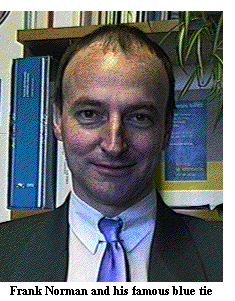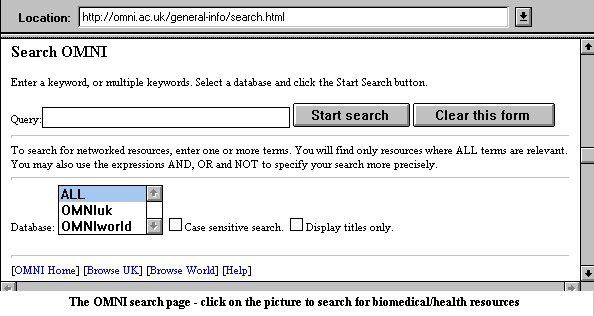OMNI: Organising Medical Networked Information
Have you ever wanted a service that could quickly and reliably guide you through the Internet jungle to a quality source of well-maintained information? Do you despair of out-of-date bookmark lists that point you to obsolete web addresses, and too-powerful Internet robot indexers that retrieve everything but what you really wanted to find? Then read the good news about the eLib programme's Access to Network Resources (ANR) projects: SOSIG, OMNI, ADAM, EEVL, IHR-INFO, CAIN and ROADS. These seven projects are set to change the face of networked information use in the UK, bringing librarians' skills to bear on the tangled web of the Internet.
There is a tendency to speak of the Internet as a system but it is also possible to conceive of it as  an information resource - infospace rather than cyberspace. Moving away from machine metaphors and towards metaphors of knowledge and information points the way to services based on human control rather than on machine control. The ANR projects take the model of the subject librarian as their starting point and apply this to the UK networked information world. Six of the projects will be devoted to creating gateways to resources in specific subjects, while one (ROADS) will develop a system to aid and automate the process of resource organisation and discovery.
an information resource - infospace rather than cyberspace. Moving away from machine metaphors and towards metaphors of knowledge and information points the way to services based on human control rather than on machine control. The ANR projects take the model of the subject librarian as their starting point and apply this to the UK networked information world. Six of the projects will be devoted to creating gateways to resources in specific subjects, while one (ROADS) will develop a system to aid and automate the process of resource organisation and discovery.
OMNI
The OMNI gateway, launched in November 1995, is a WWW interface to a catalogue of biomedical and health related information available via JANET/Internet. It facilitates discovery of, and access to, resources likely to be of interest to the biomedical and healthcare academic community in the UK. OMNI is a quality service, facilitating access to useful information. Resources are not added to the gateway until they have been filtered, catalogued, classified and subject-indexed. The filtering process weeds out material that is out of date, inappropriate or strictly local in context. The cataloguing record includes a description of each resource.
Concerned with content rather than form
Internet enthusiasts talk about Internet "wildlife" (e.g. gophers, webs, spiders and subject trees) or maybe about types of information (directories, databanks, graphics, etc.). These approaches have their place but OMNI will be relatively unconcerned about the format of networked information resources, paying more attention to the actual information content - its quality and subject. OMNI adds value to information resources by:
- adding indexing data (to improve searchability)
- arranging in classified order (to improve browsability)
- adding descriptions (to clarify purpose and use)
Concentrating on a subject group
The word "medical" in the title of the project is a compromise and is used in its broadest sense to include clinical medicine, nursing, allied health professions, biological sciences, public health and health management. Although this might seem a very wide group of subjects, all these aspects of medicine are so intertwined that it makes sense to treat them together.
User liaison
A service is nothing without users and OMNI aims to develop good links with the user community in the UK higher education and research sectors. OMNI is launching its basic service early in the life of the project in an attempt to provide benefits to the community as soon as possible, and to give users the opportunity to mould the future service. The Internet has grown through a spirit of openness and feedback and OMNI hopes to grow in the same way.
Specialist knowledge
Many specialised classification and indexing schemes exist in different subject areas which aid retrieval of specialist concepts. In the medical area the (US) National Library of Medicine (NLM) maintain well-respected indexing and classification systems. Each resource in the OMNI database will be classified using the NLM classification scheme, widely used in medical libraries in the UK, as well as the Universal Decimal Classification (UDC). The MeSH thesaurus, as used in Medline and related healthcare databases, will be used to index resources. Later in the project the NLM's Unified Medical Language System (UMLS) will be used to enhance subject indexing.
What will OMNI mean for you?
The service
OMNI provides YOU with a much better way of locating useful information on the Internet, and provides your USERS with a better way too, provided you tell them about it. It is better because it is selective, it is UK-based hence faster and with less US bias, it is well-indexed, and it provides descriptions of resources. This latter feature means that users can decide whether a resource is likely to be useful before trying to access it.
OMNI will help you to open up the world of networked information to your users without the risk of them drowning. Unlike most existing services, OMNI will guide users to substantive information resources rather than show them every conceivable (and irrelevant) information source. A user of SOSIG recently neatly summarised the philosophy underlying both SOSIG and OMNI:
"Given the amount of information on the net, the real value of a resource such as yours is, paradoxically, not that it is comprehensive but that it is selective of high quality resources"
The concept
The IT section of the Follett report contained many recommendations, intended "not to deliver the virtual library tomorrow but to ... provide some of the electronic bricks from which the virtual library may be made" [1]
OMNI does not provide new information but adds value to existing information by providing an organised framework for its discovery and use. The development of student-centred teaching and learning and the need to provide information support to isolated researchers will both require better access to information over networks.
What can you do for OMNI?
OMNI is closely linked to the community that it serves and wishes to involve as wide a range of people as possible in order to continue building the service. This will be critical for the next phase of the project (up to December 1996) as a faster rate of growth becomes necessary. You can help OMNI by volunteering to monitor and add resources in specified areas, or to review OMNI's coverage of your specialist subject area. You can also help the development of information provision by encouraging information owners at your institution to make their information available via the network and by promoting good publishing practices.
Sources of further information
The primary source of information about OMNI is its WWW page:
http://omni.ac.uk/
The OMNI discussion list at mailbase is a forum for disseminating news about the OMNI Project, for discussion about the project and comments on the service provided.
To join the list send the command:
Join omni firstname(s) lastname
(substituting appropriately) as the only text in the body of a message addressed to: mailbase@mailbase.ac.uk
References
1. Law, D. The Follett report: panacea or placebo? Relay, (1994) 40: 3-4.

